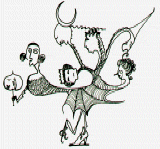|
Antique Fully fitted Coromandel sewing box of
architectural form circa 1835
Please click on images to enlarge | slide show | thumbnail index |
Reference: Sb492
Description:
SB492: An impressive sewing box veneered in saw cut highly figured coromandel, fitted with mother of pearl sewing tools.
Circa 1835.
The form of the box is in the tradition of the second phase of neoclassicism. It is constructed so as to convey the solidity and the structural sophistication of an Egyptian temple.
The interior is fitted with a set of ten (!) spools and other tools, arranged in a tray lined in patterned paper and having compartments lidded in purple velvet.
Origin: UK
Circa: 1835
Materials:
Size: 32.5 cm wide by 26 cm by 20.5 cm:
12.8 inches wide
by 10.2 inches by 8.1 inches.
Condition: good
overall; see images
|
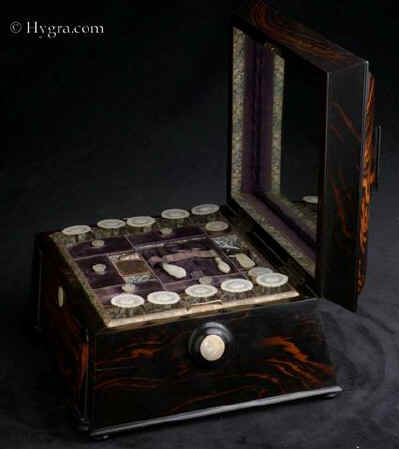
|
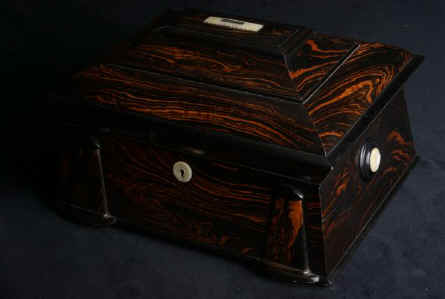
|
The form of the box is in the tradition of the second phase of neoclassicism. It is constructed so as to convey the solidity and the structural sophistication of an Egyptian temple.
|
Please click on images to enlarge | slide show | thumbnail index |
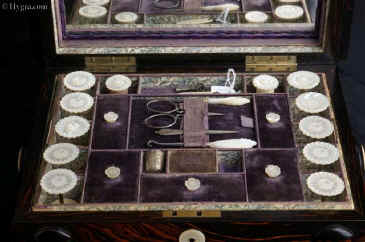
|
The interior is fitted with a set of ten (!) spools and other tools, arranged in a tray lined in patterned paper and having compartments lidded in purple velvet.
The side showing a mother of pearl finished handle.
|
The front of the box showing two ‘pillars’ suggesting the upward movement of the eye as they taper towards the top of the box, which in turn suggests the pediment of a classical structure.
|
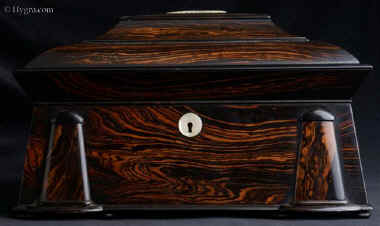
|
Please click on images to enlarge | slide show | thumbnail index |
The other side. The two profile images show the skilful use of concave and convex layers, which create a strong, but not harsh form. The sophistication of the shape can also be appreciated in this picture: The sides taper in and the lid tapers out before pyramiding to the top. This is exactly how a temple would be perceived from the ground.
|
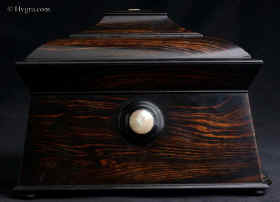
|
Please click on images to enlarge | slide show | thumbnail index |
The top of the box is accented in mother of pearl carved in the form of an inverted squared patera design, another reference to classicism. The figure of the wood is taken full advantage of.
|
 (Small).JPG)
|
 (Small).JPG)
|
The top on its own.
|
Please click on images to enlarge | slide show | thumbnail index |
 (Small).JPG)
|
The interior. The mirror is in my opinion a later addition.
|
Detail of tray showing the ten spools, waxer and needle cleaner; an impressive assembly.
|
 (Small).JPG)
|
The spools are of the later type, after 1830, with metal slip on stems.
|
 (Small).JPG)
|
Please click on images to enlarge | slide show | thumbnail index |
 (Small).JPG)
|
Detail of beautifully turned and carved spool.
|
 (Small).JPG)
|
Other tools.
|
Please click on images to enlarge | slide show | thumbnail index |
Working lock and key.
|
 (Small).JPG)
|
 (Small).JPG)
|
Later thimble. Thimbles tend to change with the owners.
|
Please click on images to enlarge | slide show | thumbnail index |
 (Small).JPG)
|
Detail showing the paper.
|
The space under the tray.
|
 (Small).JPG)
|
The box underneath retains the original paper. The arrangement of feet takes into consideration the ‘pillar’ structure.
|
 (Small).JPG)
|
Please click on images to enlarge | slide show | thumbnail index |
All text and images and linked images are ©
1999-2010 Antigone Clarke and Joseph O'Kelly. If you require any further
information on permitted use, or a licence to republish any material, email us
at copyright@hygra.com
| 